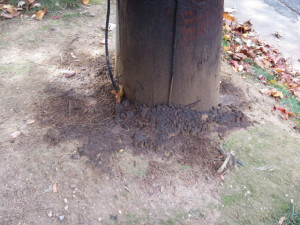United Nations Committee Recommends Global Elimination of Toxic Wood Preservative
On November 4, 2014, a United Nations Committee Recommended Global Elimination of the toxic wood preservative, pentachlorophenol.
ENEWSPF wrote that "Pentachlorophenol (PCP) is widely used in the United States and elsewhere for treatment of wooden utility poles and railroad ties. Scientists cite chemical’s persistence, bioaccumulation, long-range transport, and PCP’s toxic impacts in recommending it being listed in the Stockholm Convention on Persistent Organic Pollutants, an international treaty established to safeguard human and environmental health from highly hazardous chemicals. The committee further noted the wide availability of non-chemical alternatives much safer than PCP, which include steel, composite, and concrete poles, as well as the burying of power lines."
ENEWSPF goes on to quote Pamela Miller, the executive director of Alaska Community Action on Toxics, and one of the expert witnesses for LIBFRE's (Long island Businesses For Responsible Energy, Inc.) lawsuit against PSEG and LIPA. Pam states that, "This is the beginning of the end of pentachlorophenol. Pentachlorophenol has global health implications since it is found in the bodies of people throughout the world including Indigenous Peoples of the Arctic. Now governments and the private sector need to get to work to finally eliminate this toxic chemical."
The United States is one of only a handful of countries that has not ratified the international environmental treaty, signed in 2001 and effective from May 2001, that aims to eliminate or restrict the production and use of persistent organic pollutants.
In a shocking move this past October, as this international community of scientists met in Rome, the USA recommended that the group "do nothing" and that action on banning pentachlorophenol be tabled.
While the U.S. Environmental Protection Agency (EPA) has sought to oppose efforts to ban the chemical, the U.S. Department of Health and Human Services included PCP in its 13th Report on Carcinogens, declaring the substance "reasonably anticipated to be a human carcinogen."
At the same time the EPA is fighting the international ban on pentachlorophenol, there is growing concern in the United States over the failure of the EPA to stop the use of this toxic chemical.
In New York State, Assemblyman Fred Thiele and Senator Ken LaValle have introduced bipartisan legislation to ban pentachlorophenol, that would prohibit the future use of utility poles treated with pentachlorophnol (PCP), and call for the posting of warnings to inform people about the dangers of contact with PCP on existing poles.
Senator LaValle said, "This is a critical health and safety matter. People need to be made aware of the presence of PCP, so they can protect themselves, their children and their pets from the potential dangers posed by this chemical. This type of coating to preserve utility poles needs to be discontinued for public health reasons as soon as possible."
Assemblyman Thiele noted, "The federal government has made it clear that PCP is a dangerous chemical and has outlawed its use by the general public. It is to be used only for industrial use away from the general population. Yet, this chemical has been used to treat utility poles for transmission lines in places like East Hampton that are only a few feet from residential dwellings, exposing children and families to this dangerous substance. Further, at a time when we are all focused on the degradation of our water, it is inconceivable that wood treated with this substance would be permitted to leach into the goundwater on Long Island. There are better options, and those options should be implemented now."
Long Island Businesses for Responsible Energy, Inc. (LIBFRE), a local East Hampton citizens' group, is continuing its litigation against PSEG/LIPA for installing 267 pentachlorophenol laden utility poles along a 6.2 mile run through residential neighborhoods. They have just filed an amended complaint and are preparing opposition papers to PSEG and LIPA's motion to dismiss. They are asking to have all the utility poles removed and the high-tension wires buried underground.
The Town and Village of East Hampton are conducting water tests for pentachlorophenol adjacent to three newly installed utility poles along the 6.2 mile run, after finding PCP present in an initial water test. A soil test done in April 2014, revealed PCP levels over 300 times acceptable levels as stated by the NYS Department of Environmental Conservation.
In September, the Town of North Hempstead located in Nassau County on Long Island, passed a law requiring warning labels on utility poles treated with PCP. The mandated labeling states, "This pole contains a hazardous chemical. Avoid prolonged direct contact with this pole. Wash hands or other exposed areas thoroughly if contact is made."
And in a recently released book, Poison Spring: The Secret History of Pollution and the EPA, by E.G. Vallianatos, a long-term former employee and whistleblower, details how unsafe EPA testing is, and how corrupt many at the top of the EPA are, even while others there want to and wish to do the right thing. The EPA is an underfunded agency that is in the hands of powerful and very well funded lobbyists. It is a neutered agency that isn't doing its job.
Check out the following websites for more information:
Sources: IPEN, http://www.beyondpesticides.org, and http://www.LIBFRE.com



